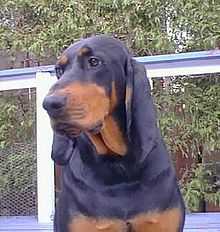Coonhound
- Not to be confused with the Dachshund.
A Coonhound is a type of scent hound and a member of the hound group.
Coonhounds are an American style of hunting dog developed for the quarry and working conditions found in the United States. Coondogs are highly valued.[1]
History
In the colonial period, foxhounds were imported for the popular sport of foxhunting. Various breeds of foxhounds and other hunting hounds were imported from England, Ireland, and France, making up the initial composition of the dogs that were later known as “Virginia Hounds”.
Foxhounds were found to be inadequate for hunting animals that did not hide near the ground, but instead took to the treetops to escape, such as raccoons, opossums, bobcats, and even larger prey like cougars and bears. The dogs were often confused or unable to hold the scent when this occurred, and would mill about.
The name is derived from their original use in hunting raccoons.
Treeing dogs were developed, chosen for a keen sense of smell, the ability to track, chase and corner any manner of animal independent of human commands, and, most importantly, to follow an animal both on the ground and when it takes to the trees. A good coonhound will bark and keep its prey treed until the hunters arrive. Bloodhounds specifically were added to many coonhound lines to enhance the ability to track. Some dogs have webbed toes to deal with the rivers and swamps so common in their hunting grounds.
Coonhounds can hunt individually or as a pack. Generally, hunters do not chase their quarry along with the hounds, unlike organized foxhunting, but wait and listen to the distinctive baying to determine if prey has been treed. Coonhounds are excellent at handling all manner of prey if trained properly.
Breeds
There are several individual breeds of Coonhound:
- Black and Tan Coonhound
- Bluetick Coonhound
- American English Redtick Coonhound
- Plott Hound
- Redbone Coonhound
- Treeing Walker Coonhound
Memorials
The Key Underwood Coon Dog Memorial Graveyard in Colbert County, Alabama, is dedicated for the burial of coon dogs.[2]
